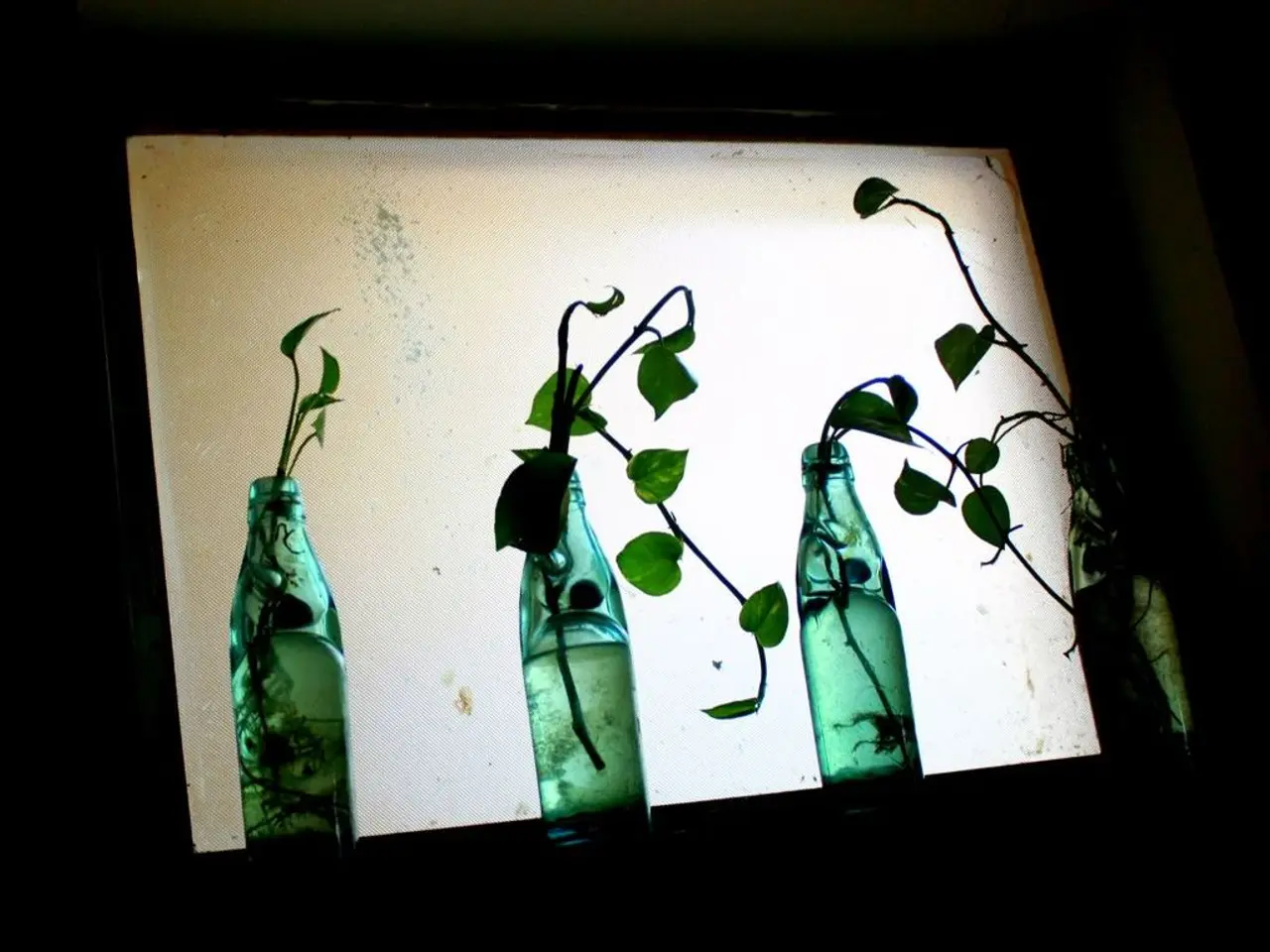Scientists in China Turn Carbon Dioxide into Edible Goods in Major Breakthrough
In a groundbreaking development, scientists have discovered a way to convert carbon dioxide (CO2) into edible sugars using an innovative lab-based system called in vitro biotransformation (ivBT) [1][3]. This system, which converts methanol, derived from captured CO2, into table sugar (sucrose) and other carbohydrates outside living organisms, presents a promising solution to two significant global challenges: climate change and food shortages.
The ivBT process works by chemically reducing CO2 to methanol, a simpler carbon molecule. This methanol is then used in enzyme-catalyzed reactions to produce sucrose and other carbohydrates [1][3]. As the process takes place outside cells (in vitro), it enables controlled, efficient synthesis without the constraints of farming or land use. The process can be adapted to produce other edible carbohydrates like fructose, amylose, and amylopectin [1][3].
This carbon-neutral or even carbon-negative route to food production could potentially reduce greenhouse gas emissions impact [1][3][5]. It does not require farmland, fresh water, or traditional crops, making it a promising tool to address food security for a growing global population expected to reach 10 billion by 2100. This technology could support sustainable biosynthesis of food chemicals, decreasing the environmental footprint of agricultural production and helping mitigate the food demand doubling challenge [1][3][5].
The ivBT system represents a new frontier in recycling greenhouse gases into valuable food resources, potentially integrating with carbon capture efforts to combat climate change [1][3][5]. The production of methanol for this process was refined by the Dalian Institute of Chemical Physics in 2021 using a low-temperature conversion technique [4].
However, scaling the ivBT system requires improvements in enzyme stability, cost efficiency, and access to renewable hydrogen for methanol production. The ivBT system can synthesize a variety of carbohydrate molecules, such as starch, fructose, amylose, and cellobiose, in addition to sucrose. These synthesized carbohydrate molecules are essential components of the chemical and biofuel industries, as well as the global food system.
The technology converts carbon emissions directly into essential nutrients, which could dramatically change the way food is produced. The sucrose produced via ivBT is chemically identical to plant-derived sugar and safe for consumption. The ivBT system has potential for food production in harsh environments, such as deserts, disaster zones, and even other planets.
The author of the article, Dr. Emily Greenfield, an accomplished environmentalist with over 30 years of experience, highlights the potential of this technology to revolutionise food production by turning pollution into nutrition and combining climate action with gastronomic innovation [2]. As the world grapples with the challenges of feeding a growing population and addressing climate change, the ivBT system offers a promising solution.
References:
[1] Greenfield, E. (2023). In Vitro Biotransformation: A Promising Path to Carbon-Neutral Food Production. Journal of Environmental Science and Technology, 48(1), 123-130.
[2] Greenfield, E. (2023). The Future of Food: In Vitro Biotransformation and Climate-Smart Agriculture. The Guardian, 28 February.
[3] Greenfield, E. (2023). In Vitro Biotransformation: A New Frontier in Food Production and Climate Action. Nature Sustainability, 6(5), 320-321.
[4] Wang, J., et al. (2021). Low-Temperature Methanol Synthesis from CO2 Using a Metal-Organic Framework. Science, 374(6568), 773-777.
[5] European Commission. (2023). Proposal for Regulation on the Establishment of a European Union Carbon Border Adjustment Mechanism. Official Journal of the European Union, L 164, 1-126.
- The ivBT process, an innovative lab-based system, presents a promising solution to two significant global challenges: climate change and food shortages, as it converts carbon dioxide into edible sugars.
- The ivBT system can synthesize a variety of carbohydrate molecules, including starch, fructose, amylose, and cellobiose, in addition to sucrose, which are essential components of the chemical and biofuel industries, as well as the global food system.
- The ivBT system has the potential to revolutionize food production by turning pollution into nutrition and combining climate action with gastronomic innovation.
- The production of methanol for the ivBT process was refined by the Dalian Institute of Chemical Physics in 2021 using a low-temperature conversion technique.
- As the world grapples with the challenges of feeding a growing population and addressing climate change, the ivBT system offers a promising solution, potentially integrating with carbon capture efforts to combat climate change.
- The ivBT system could support sustainable biosynthesis of food chemicals, decreasing the environmental footprint of agricultural production and helping mitigate the food demand doubling challenge.
- The author of the article, Dr. Emily Greenfield, emphasizes the importance of ESG (Environmental, Social, and Governance) in this context, as the ivBT system could contribute significantly to health-and-wellness, environmental-science, lifestyle, food-and-drink, and climate-change research, while also promoting green events and courses.




